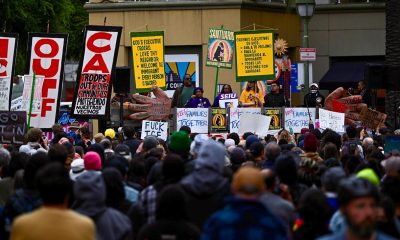Bay Area
‘Extremely Disturbing’: City Audit Reveals Mayor’s Office of Housing Has $482 Mil in Unspent Funds
A San Francisco supervisor is calling for a hearing to find solutions to problems within the city’s affordable housing production team. Supervisor Dean Preston requested the hearing during the Board of Supervisors meeting on Tuesday, in response to a nearly two-year performance audit of the Mayor’s Office of Housing and Community Development released the same day.

By Olivia Wynkoop
Bay City News
A San Francisco supervisor is calling for a hearing to find solutions to problems within the city’s affordable housing production team.
Supervisor Dean Preston requested the hearing during the Board of Supervisors meeting on Tuesday, in response to a nearly two-year performance audit of the Mayor’s Office of Housing and Community Development released the same day.
The audit found that the department, which oversees the city’s affordable housing projects, counted on informal records and internal discussions for its decision-making. The department has also had an average surplus of $482 million in unspent funds for the past five years.
Per request by the Board of Supervisors in July 2021, the San Francisco Budget and Legislative Analyst investigated how the housing department reported the status of housing projects, prioritized funding and handled unspent funds.
The audit found that the department did not comply with city reporting requirements, did not have a formalized record-keeping system on how financial decisions were made and could not provide clarity on where unused funds are going.
The audit cited that 93 percent of the department’s unused funds were dedicated to housing developments, though it’s unknown if 58 percent of those funds are officially set in stone with a committed loan.
Preston, who called for the audit, alleged that the office itself is a “major barrier” to the city reaching its ambitious affordable housing goals – San Francisco is aiming to build 46,500 new units by 2031.
“Given what is revealed in this audit, I am deeply concerned that we are entrusting the crucial task of affordable housing production to a department that has no oversight, no transparency, no policies guiding key funding decisions, and cannot even account for a half billion-dollar balance — namely how much is committed and how much is available,” Preston said at Tuesday’s meeting.
Eric Shaw, director of MOHCD, responded to the audit via letter, and said the department faces “substantial complexities” that make it difficult to make concrete policies.
“Due to the complexity of aligning unpredictable funding streams in a volatile market, financing affordable housing projects is a complex process that cannot be replicated or standardized over years or across projects,” reads the letter addressed to Severin Campbell, director of the Budget and Legislative Analyst’s Office.
Alameda County
Seth Curry Makes Impressive Debut with the Golden State Warriors
Seth looked comfortable in his new uniform, seamlessly fitting into the Warriors’ offensive and defensive system. He finished the night with an impressive 14 points, becoming one of the team’s top scorers for the game. Seth’s points came in a variety of ways – floaters, spot-up three-pointers, mid-range jumpers, and a handful of aggressive drives that kept the Oklahoma City Thunder defense on its heels.

By Y’Anad Burrell
Tuesday night was anything but ordinary for fans in San Francisco as Seth Curry made his highly anticipated debut as a new member of the Golden State Warriors. Seth didn’t disappoint, delivering a performance that not only showcased his scoring ability but also demonstrated his added value to the team.
At 35, the 12-year NBA veteran on Monday signed a contract to play with the Warriors for the rest of the season.
Seth looked comfortable in his new uniform, seamlessly fitting into the Warriors’ offensive and defensive system. He finished the night with an impressive 14 points, becoming one of the team’s top scorers for the game. Seth’s points came in a variety of ways – floaters, spot-up three-pointers, mid-range jumpers, and a handful of aggressive drives that kept the Oklahoma City Thunder defense on its heels.
One of the most memorable moments of the evening came before Seth even scored his first points. As he checked into the game, the Chase Center erupted into applause, with fans rising to their feet to give the newest Warrior a standing ovation.
The crowd’s reaction was a testament not only to Seth’s reputation as a sharpshooter but also to the excitement he brings to the Warriors. It was clear that fans quickly embraced Seth as one of their own, eager to see what he could bring to the team’s championship aspirations.
Warriors’ superstar Steph Curry – Seth’s brother – did not play due to an injury. One could only imagine what it would be like if the Curry brothers were on the court together. Magic in the making.
Seth’s debut proved to be a turning point for the Warriors. Not only did he contribute on the scoreboard, but he also brought a sense of confidence and composure to the floor.
While their loss last night, OKC 124 – GSW 112, Seth’s impact was a game-changer and there’s more yet to come. Beyond statistics, it was clear that Seth’s presence elevated the team’s performance, giving the Warriors a new force as they look to make a deep playoff run.
Activism
Oakland Post: Week of November 26 – December 2, 2025
The printed Weekly Edition of the Oakland Post: Week of November 26 – December 2, 2025

To enlarge your view of this issue, use the slider, magnifying glass icon or full page icon in the lower right corner of the browser window.
Activism
Oakland Post: Week of November 19 – 25, 2025
The printed Weekly Edition of the Oakland Post: Week of November 19 – 25, 2025

To enlarge your view of this issue, use the slider, magnifying glass icon or full page icon in the lower right corner of the browser window.
-

 Activism3 weeks ago
Activism3 weeks agoOakland Post: Week of November 12 – 18, 2025
-

 Activism3 weeks ago
Activism3 weeks agoIN MEMORIAM: William ‘Bill’ Patterson, 94
-

 Activism3 weeks ago
Activism3 weeks agoHow Charles R. Drew University Navigated More Than $20 Million in Fed Cuts – Still Prioritizing Students and Community Health
-

 Bay Area3 weeks ago
Bay Area3 weeks agoNo Justice in the Justice System
-

 #NNPA BlackPress3 weeks ago
#NNPA BlackPress3 weeks agoThe Perfumed Hand of Hypocrisy: Trump Hosted Former Terror Suspect While America Condemns a Muslim Mayor
-

 #NNPA BlackPress2 weeks ago
#NNPA BlackPress2 weeks agoTrump’s Death Threat Rhetoric Sends Nation into Crisis
-

 #NNPA BlackPress4 weeks ago
#NNPA BlackPress4 weeks agoProtecting Pedophiles: The GOP’s Warped Crusade Against Its Own Lies
-

 #NNPA BlackPress2 weeks ago
#NNPA BlackPress2 weeks agoLewis Hamilton set to start LAST in Saturday Night’s Las Vegas Grand Prix






















































